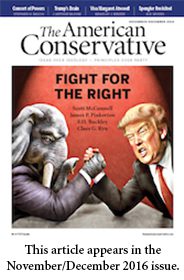Populism Needs Place-ism

With every generational populist efflorescence (those who disapprove call it a “recrudescence”) two things are guaranteed:
First, the prosy men with leaden eyes of the New York Times will rouse themselves from complacent torpor into a Cerberus-like defense of the ruling class against the intruder. The Times of 1896 on William Jennings Bryan (a “cheap and shallow … blatherskite” with an “unbalanced and unsound mind,” though whether or not Bryan was “insane,” the Times editorialist of 1896 conceded, “is a question for expert alienists”) is no different than the Times in 2016 on Donald Trump. For his part, Trump probably thinks Bryan’s Cross of Gold would make a classy adornment to the Mar-a-Lago Club chapel.
The second certainty is that middlebrow thumb-suckers and chin-pullers will invoke midcentury historian Richard Hofstadter, whose 1964 essay that refuses to die, “The Paranoid Style in American Politics,” ascribed dissent from the Cold War Vital Center consensus to mental illness. In your guts, as LBJ backers said of Barry Goldwater, you know he’s nuts.
Or they’ll quote Hofstadter’s The Age of Reform, winner of the Pulitzer Prize—always a bad sign—in which populism is merely “the simple virtues and unmitigated villainies of a rural melodrama” writ large, and it ulcerates with “nativist phobias,” “hatred of Europe and Europeans,” and resentment of big business, intellectuals, the Eastern seaboard, the other bulwarks of Time-Life culture, circa 1955. (Only a Vital Centurion could believe that wishing to refrain from killing Europeans in wars is evidence of “hatred of Europe and Europeans.”)
Well, two can play at tendentiousness. I’d say that American populism, in its various guises, has been distinguished by three basic beliefs: 1) concentrated wealth and power are pernicious, so widespread distribution of both is the proper condition; 2) war and militarism are ruinous to the republic and to the character (not to mention physical health) of the people; and 3) ordinary people can be trusted to make their own decisions.
The Democratic candidate this time around is the most hawkish nominee of her party since LBJ in 1964 and its most pro-Wall Street standard bearer since John W. Davis in 1924. She is, in every way, including her “the peasants are revolting” shtick, the compleat anti-populist.
But Hillary’s awfulness should not obscure the truth that a healthy populism requires anchorage. It must be grounded in a love of the particular—one’s block, one’s town, one’s neighbors (of all shapes and sizes and colors)—or else it is just a grab bag of resentments, however valid they may be.
An unmoored populism leads to scapegoating and the sputtering fury of the impotent. Breeding with nationalism, it submerges local loyalties and begets a blustering USA! USA! twister of nothingness.
From out of that whirlwind spin the faux-populists of the Beltway Right: placeless mountebanks banking the widow’s mite in Occupied Northern Virginia. To a man they are praying for a Hillary Clinton victory, which would be the Clampetts’ oil strike and the winning Powerball ticket all rolled into one. President Clinton the Second would be the most lucrative hobgoblin for the ersatz populists of Birther Nation since Teddy Kennedy crossed his last bridge.
Place-based populism, seeded in love, defends a people against the powerful external forces that would crush or corrupt or subjugate them. It’s Jane Jacobs and her “bunch of mothers” fighting Robert Moses on behalf of Greenwich Village. It’s the people of Poletown, assisted by Ralph Nader, defending their homes and churches against the depredations of General Motors and the execrable Detroit Mayor Coleman Young. It’s parents—whether in South Boston, Brooklyn, or rural America—championing their local schools against berobed bussers, education bureaucrats, and Cold War consolidators.
 For a span in the early 1990s, Jerry Brown dabbled in populism. Alas, the protean Brown, once returned to California’s governorship, became his father, the numbingly conventional liberal hack Pat Brown, though the chameleonic Jesuit may have one final act left him, perhaps as a nonagenarian desert ascetic.
For a span in the early 1990s, Jerry Brown dabbled in populism. Alas, the protean Brown, once returned to California’s governorship, became his father, the numbingly conventional liberal hack Pat Brown, though the chameleonic Jesuit may have one final act left him, perhaps as a nonagenarian desert ascetic.
A quarter-century ago, Brown spoke of the populists’ struggle against “a global focus over which we have virtually no control. We have to force larger institutions to operate in the interest of local autonomy and local power. Localism, if you really take it seriously, is going to interrupt certain patterns of modern growth and globalism.”
The harder they come, the harder they fall, as Jimmy Cliff sang.
The two self-styled populists who made 2016 interesting never so much as glanced at, let alone picked up, the localist tool recommended by Jerry Brown in one of his previous lives. Their populism, dismissive of the local, is hollow. It’s all fury and no love. But tomorrow, as a Georgia lady once wrote, is another day.
Bill Kauffman is the author of 10 books, among them Dispatches from the Muckdog Gazette and Ain’t My America.
Comments